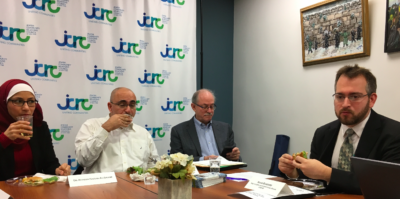When Khadra Hasan Ali Salami goes to work every morning, she has to pass through Israeli military checkpoints, an often dangerous prospect for someone driving a car with Palestinian license plates. Salami, an oncologist, is one of about 700 doctors from Palestine that have permission to cross into Israel every day for work.

On Jan. 22, Salami and Adi Leiba, an Israeli professor of medicine, spoke about their work at a Jewish Community Relations Council of New York event. Healthcare, they believe, is the path to peace in Israel and Palestine.
The event is one of several that will take place across the country in the next two weeks.
“We hear so much in the news about Israelis and Palestinians at odds, you know, even just look at the last week,” said Noam Gilboord, director of Israel and international affairs at JCRC NY, introducing the event. “It often takes away from the complexities of the conflict and does such a disservice to the people on the ground.” Not only is there a push to treat Palestinian children in Israeli facilities, which often have more and better equipment, but also to develop better healthcare in Palestine.
Project Rozana is one such organization helping doctors like Salami and Leiba do this work. They train doctors in Israeli hospitals, transport Palestinian patients to and from checkpoints, and treat those patients when the Palestinian Authority is no longer able to afford it. The project started in Australia in 2013 with a focus on building peace through healthcare.
“That’s really the headline of the entire organization, not just the program today,” said Ken Bob, the chairperson of Project Rozana in the United States. “We believe it’s an area, probably the largest area in civil society, across the Israeli-Palestinian communities in which there is every day, every minute, cooperation.”
Bob introduced Salami and Leiba at the event, saying that, rather than present a PowerPoint with medical statistics, the organizers wanted the audience to humanize the issue.
Salami spoke about her experience as a doctor in Palestine where she lacks Israel’s higher-level facilities.
“I’m really willing and I’m really happy to do the training and the fellowship,” she said. “But so many issues face me. First of all, I have to leave the country because we don’t have an advanced system to continue the education at any hospital in Palestine. And leaving the work and leaving the family is not easy.”
She said she has worked with many Israeli doctors, always without issues.
“As a doctor, I don’t have any problem dealing with an Israeli doctor because we are talking about a patient,” said Salami. “My patients should have the best of the best.”
Leiba spoke next about his experiences practicing medicine in the Israeli Defense Forces. Leiba had only been a civilian for a little over three weeks when he came to New York. Before leaving the army, he started to think about what comes next.
“I realized I had an opportunity to make medicine a bridge between our people,” said Leiba. “And that’s exactly what I did. I must say, humbly, that you need some courage to do it within the army because the army by definition, it’s a military organization, but I must also say that my commanders were very fond of it.”
Immediately, Leiba started organizing conferences with Israeli and Palestinian doctors.
“We did an amazing kidney conference in Nablus,” he said. “So, we did the medical conference, went to the top of the hill and looked at the amazing Palestinian city of Nablus.”
During the question and answer portion, Bob asked both speakers to address challenges as well as positives. Leiba mentioned that patients often die on the way to the hospitals. Salami added that it is a challenge for poor families in Palestine to afford Israeli medical treatment.
“And it’s treatment not just for one thing,” said Salami. “They have to come back every few weeks for a session, for chemotherapy.”
The event concluded with the point that, although we are inundated with news about war in the Middle East, there are people there leading normal lives, hoping for peace. Both speakers believe that their professions will bridge the Israeli-Palestinian divide.
“It’s not just what we hear in the news,” said Salami. “Talking to each other will bring people together.”

